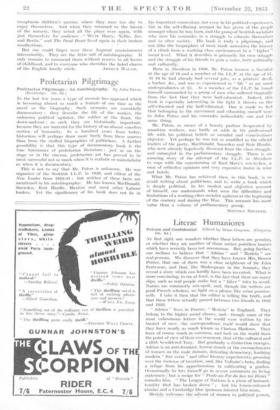Proletarian Pilgrimage
Proletarian Pilgrimage : An Autobiography. By John Paton. (Routledgo. 10s. Oct.) Proletarian Pilgrimage : An Autobiography. By John Paton. (Routledgo. 10s. Oct.) Ix the last few years a type of memoir has appeared which is becoming almost as . much a feature of our time as the novel or the biography. Such memoirs arc essentially documentary : they describe the life of the worker, the unknown political agitator, the soldier at the front, the doWn-and-out : as such they are historically important, because they arc material for the history of an almost voiceless section of humanity. In a hundred years from today, historians will perhaps draw more freely from these sources than front the stuffed biographies of politicians. A further possibility is that this type of documentary book is the true forerunner of proletarian literature : just as on the stage or in the cinema, proletarian art has proved to be most successful not so much when it is realistic or materialistic as when it is documentary.
This is not to say that Mr. Paton is unknown. He was organiser of the Scottish I.L.P. in 1920, and editor of the New Leader- from 1929-31 : but -neither of these facts are mentioned in his autobiography. He has known MacDonald, Snowden, Kok Hardie, Maxton and most other Labour leaders. Yet the significance of his book does not lie in his important connexions, nor even in his political experiences, bUt in the self-effacing' account he has given of the people amongst whom he was born; and the group of Scottish socialists who were his comrades in a struggle to educate themselves and to alter society. his book is truly a pilgrimage, and not (like the biographies of most trade unionists) the history of a climb from a working class environment to a " higher social level. What it describes is primarily his own struggle and the struggle of his friends to gain a voice, both politically,.
and culturally. • Born in Aberdeen in 1886, Mr. Piston became a Socialist at the age of 16 and a member of the I.L.P. at the age of 17. At 16 he had already had several jobs; as a printerS' devil,'
a barber, and was as experienced in " life " as arc most undergraduates at 25. As a member of the I.L.P. he found himself surrounded by a group of men who suffered tragically from the fact that they were half-educated. Indeed, this book is especially interesting in the light it throws on the self-educated and the half-educated. One is made to feel that belonging to the movement and educating oneself were to John Paton and his comrades indissolubly one and the same thing.
Mr. Paton, as owner of a beauty parlour frequented by munition workers, was badly at odds in his professional life with his political beliefs as socialist and conscientious objector. Yet perhaps he was not so muddled as the offioial leaders of the party, MacDonald, Snowden and Keir Hardie, who were already hopelessly divorced from the class struggle, and entangled in the parliamentary struggle. There is an amusing story of the attempt of the I.L.P. in Aberdeen. to cope with the . entertaining of Karl Marx's son-in-law, ts man of orthodox opinions and very expensive tastes in wine and hotels.
What Mr. Paton has achieved then, in this book, is to avoid -Writing about politicians, and to write a book which is deeply political. In his modest and objective account of himself, one understands what were the difficulties awl limitations of a working-class socialist agitator at the beginning of the century and during the War. This account has amore value than a volume of parliamentary gossip..
STEPHEN SPENDER..






























































































 Previous page
Previous page